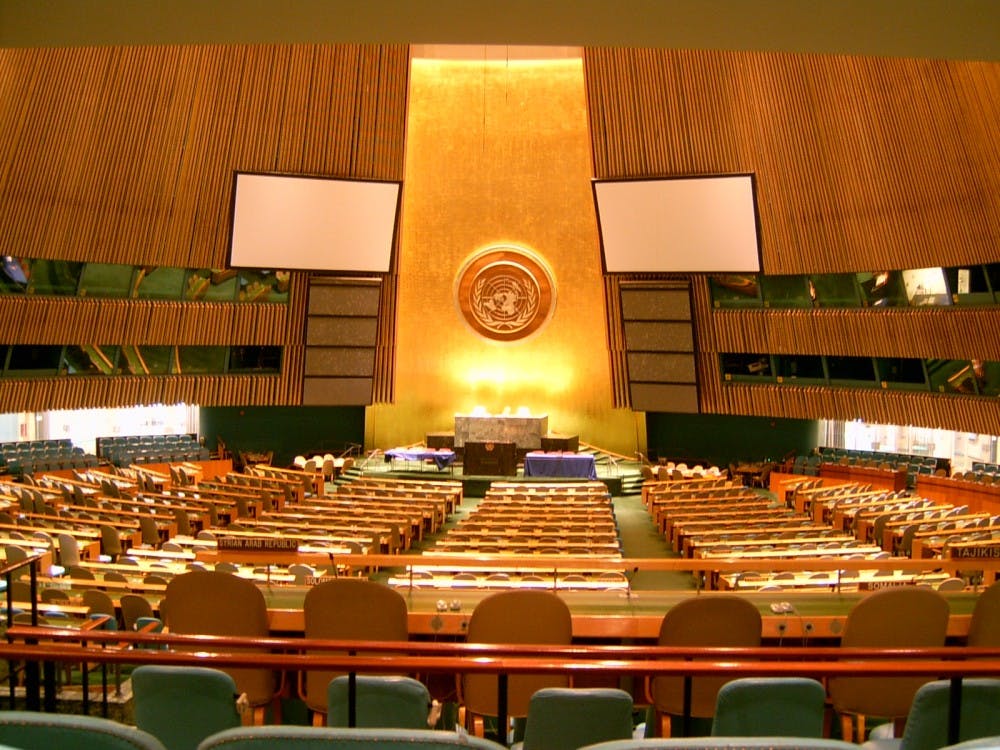U.S. and Iranian leaders had a war of words Tuesday at the United Nations General Assembly in New York City, while at the same time in Tehran, fourth-year history graduate student Xiyue Wang was presumably hoping for positive news from the annual meeting of world leaders.
Wang has been arbitrarily imprisoned by Iranian authorities on an unlawful conviction of espionage since August 2016, and the University and Wang’s family are using the assembly as an opportunity to discuss the possibility of his release.
“We wanted to take advantage of the fact that so many world leaders are in one place at one time to focus attention on his detention,” Robert Durkee, University vice president and secretary, told The Daily Princetonian on Wednesday.
On Tuesday, President Trump spent much of his 35-minute speech targeting Iran’s foreign policy and threatening new U.S. sanctions. In separate speeches, Iranian leaders sharply criticized Washington’s decisions to pull out of the 2015 Iran nuclear deal and the Paris climate accord.
The price of crude oil, which hangs in the balance of sanctions decisions, reached a four-year high Tuesday, according to Reuters, because of the imminent possibility of blocks to Iranian producers.
“Iran’s leaders sow death, chaos, and destruction,” Trump said to the assembly.
Meanwhile, Iran’s president Hassan Rouhani made judgements about U.S. leadership.
“Confronting multilateralism is not a sign of strength. Rather it is a symptom of the weakness of intellect — it betrays an inability in understanding a complex and interconnected world,” he said.
Hua Qu, Wang’s wife, is in New York City for the U.N. General Assembly this week, along with Joyce Rechtschaffen from the University’s Office of Government Affairs in Washington, D.C.
Qu said she hoped this year’s assembly meeting would be an opportunity for world leaders to work together to help her husband secure his freedom.
“I hope this is the last U.N.G.A.,” she said in an interview with the ‘Prince’ earlier this month, explaining that the assembly’s outcome could result in her family’s problems being solved.
Qu has continued to live in the family’s apartment in Lakeside graduate housing with her and her husband’s 5-year-old son.

Durkee explained that the University is in frequent contact with advisers and experts who may be able to help Wang’s case. “These individuals are also attending the U.N. General Assembly this week, talking to representatives from other countries and even some of the Iranian leaders,” Durkee said.
When asked how the University reacted to pointed remarks made by U.S. and Iranian leaders Tuesday, Durkee said, “We’re focused on conversations that we think we can have with people who we think might be able to help achieve his release.”
Secretary of State Mike Pompeo and National Security Advisor John Bolton both made comments at this week’s United Against Nuclear Iran summit, naming Wang and other Americans imprisoned in Iran, and demanding their release and return home.
Bolton stated that Iran is the “world’s worst kidnapper” of U.S. citizens.
In a Wednesday email to the ‘Prince,’ Rechtschaffen wrote, “We hope the speeches by the Secretary of State and National Security Advisor Bolton will help focus world attention on Wang’s unjust detention.”
Like Durkee, Rechtschaffen also said the University is trying to take advantage of U.N.G.A. this month, holding many meetings for the purpose of trying to secure Wang’s release.
Last year, the University “didn’t do anything,” for her husband at the U.N. assembly, said Qu.
According to Durkee, many conversations surrounding the possibility of Wang’s release occurred away from the U.N. General Assembly at this time last year.
This fall, pressure on Iran ramped up with the release of an opinion from the U.N. Working Group on Arbitrary Detentions which concluded that Wang should be released immediately.
“If Iran is not going to be responsive to concerns expressed by the United States, they might be responsive to concerns raised by other countries,” said Durkee.
He said other world leaders will be able to point to last month’s U.N. opinion, which states that Iran’s arrest and imprisonment of Wang are unlawful and arbitrary.
Iran has provided no evidence to support Wang’s conviction of espionage, and denied Wang’s appeal of his sentence.
“We don’t have any case file,” Qu said.
Wang was doing archival research for his history dissertation on regional governances in 18th and 19th-century Eurasia when he was arrested.
His research was financially supported by the University’s Sharmin and Bijan Mossavar-Rahmani Center for Iran and Persian Gulf Studies, among other sources.
Former director of the center John Haldon spoke with the ‘Prince’ about the nature of Wang’s struggle with Iranian authorities.
“Iran’s judiciary is a stronghold of Iranian conservatives opposed to the country’s rapprochement with the West,” Haldon said. “Under the current system, prosecutors regularly lack evidence and punishments are harsh.”
“He’s just the victim of someone else’s game,” said history professor Ekaterina Pravilova, who taught Wang in her graduate seminar, Imperial Russia. She has been in contact with him since his imprisonment.
“Every day is a new judgment about who can be helpful,” Durkee said, explaining that not a day goes by without someone pushing Wang’s case, whether it be in Washington or through diplomacy abroad.
Tuesday marked the first day of the General Debate of the 73rd United Nations General Assembly. The General Debate will continue for nine working days.
Qu did not respond to requests for comments about her experiences at the U.N. General Assembly.








